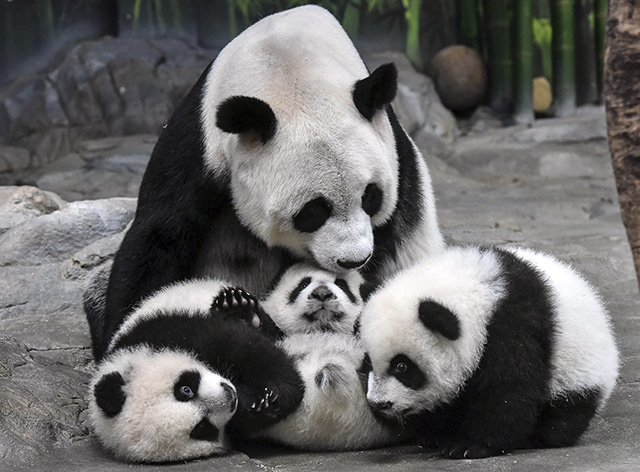Panda roars, barks, and squeaks reveal all sorts of information, scientists have found.
Giant pandas baa like sheep to say “I love you”. They also warble a cheerful “I do” when wooed by a suitor, staff at the China Conservation and Research Center for the Giant Panda in Southwest China’s Sichuan province have found.
Researchers there have decoded 13 different kinds of giant panda vocalizations in a surprising new insight into the private life of the reclusive creatures.
There’s a whole conversation happening here:
The research center has been working on a panda linguistics project since 2010 along with Austrian musicians. They used sophisticated recording devices and conducted spectral analysis to find and study these select vocalizations from 200 pandas.
Scientists made recordings of pandas at the center, including vocalizations between cubs and adults in various situations, such as when they were eating, mating, nursing, fighting, Zhang Hemin, head of the center said.
After collecting a large amount of data they analyzed the voiceprints.
“We managed to decode some panda language and the results are quite interesting,” Zhang said.
Panda cubs can barely vocalize at all, but they can emit sounds such as “Gee-Gee” (I’m hungry), “Wow-Wow” (Not happy!), or “Coo-Coo” (Nice!).
Panda cub has a lot to say to its mother
“Adult giant pandas usually are solitary, so the only language teacher they have is their own mother,” Zhang said.
When they grow a little, cubs learn how to express themselves by roaring, barking, shouting, squeaking, bleating and chirping.
“If a panda mother keeps tweeting like a bird, she may be anxious about her babies. She barks loudly when a stranger comes near,” Zhang said.
The barking can be interpreted as “get out of my space”, Zhang added.

Potential gabfest? (CCTV News photo)
Pandas can also be as gentle as a lamb when they are “in love”. Male pandas baa constantly when they are wooing their lovers. Females respond with constant tweeting if they feel the same. (Not the twitter version of tweeting of course)
“Our researchers were so confused when we began the project that they wondered if they were studying a panda, a bird, a dog, or a sheep,” Zhang said.
The center plans to continue the study and potentially creating a panda translator that can use voice recognition technology.
“If we can understand their language, it will help us protect the animal, especially in the wild,” Zhang said.
Fewer than 2,000 pandas live in the wild, mostly in Sichuan and Shaanxi provinces. There were 375 giant pandas in captivity at the end of 2013, about 200 of them at Zhang’s center.
Story by Xinhua, China Daily, and CCTV News.
 CGTN America
CGTN America Panda mother Ju Xiao plays with her triplet cubs. Photo: AP
Panda mother Ju Xiao plays with her triplet cubs. Photo: AP
